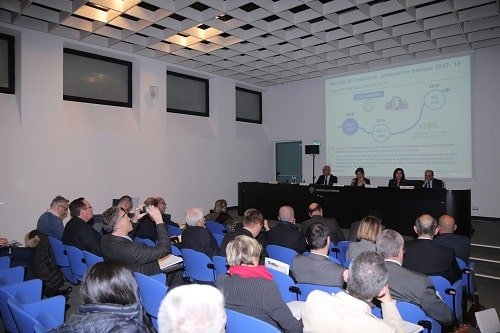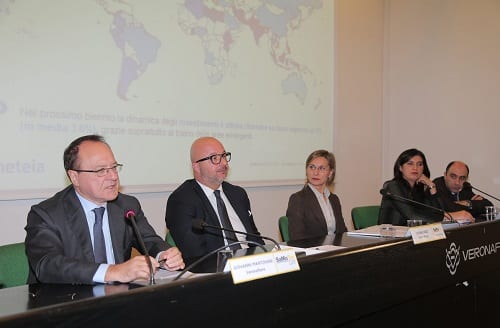Growth on the Global Market over the Next Two Years up to 38%
7,551 construction machinery units sold in Italy January-September (+32%). A further increase of +37% is estimated in Italy for the two-year period 2017-2018.
Verona, 28 November 2016 – The first nine months of 2016 saw sales around the world of 496,500 earth moving machines, 5,000 less (-1%) compared to the same period in 2015. The setback was particularly in the first quarter, while there was better overall stability in following months. The period January-September saw performances emerging markets stand out, with China (+8%) and India (+31%), and a good result in Western Europe (+11%). Setbacks were seen in North America (-3%) and Japan (-24%).
This sales trend in unitary terms was confirmed by the SaMoTer-Veronafiere Outlook, the construction sector observatory developed in partnership with Prometeia – the international economic consulting and research company – with the support of Unacea, the Italian Association of construction machinery and equipment builders.
The figures were presented today at the Verona Exhibition Centre during the third SaMoTer Day: the training and guideline event focusing on opportunities and trends in the building and construction equipment market around the world and in Italy (www.samoter.it)
Going into more detail for the “Old Continent” for the period January-August, France (+42%) and Italy (+32%) achieved double-figure growth in sales; Belgium (+14%), Germany (+14%) and Spain (+10%) all performed well. The United Kingdom posted a downturn of 12% in the wake of Brexit. In particular, with growth in eleven consecutive quarters, Italy has consolidated its recovery, but nevertheless still has to recoup losses in a sector that, following the economic crisis in 2008, shrank by more than 80%. Sales in Italy especially involved mini excavators and tele handlers. This trend is also reflected on a global scale, with world-wide sales of mini excavators up by 5% for a 23% share of the market, close behind crawler excavators (24%).

“The new report,” said Giovanni Mantovani, CEO of Veronafiere, “is another business tool that Veronafiere provides companies to support the construction sector together. Since the 2014 edition of SaMoTer, our commitment has been to develop a new show model that is increasingly responsive to business needs and market developments. Above all, the event is not only at the side of exhibitors and operators during the trade fair itself but also throughout the year thanks to a series of events, such as the SaMoter Day, dedicated to training and professional updates.”
Year-end estimates – 2016 (units sold). The forecasts developed by the Prometeia Study Centre for the SaMoTer-Veronafiere Outlook indicate a slight recovery (+2%) in the last quarter, which should settle global sales of earth moving machinery at 625,700 units (-0.4%). This market stagnation is also the outcome of downsized investments in the construction sector and, consequently, the propensity to buy new machinery. At the end of the year, Western Europe will make the most significant contribution to world demand for machinery and technologies, climbing back to a 26.6% share of the world market after the rock bottom figure of 18.8% posted in 2010. After 5 years of setback, even China’s share of the market began improving again and should close the year at 13.6%, albeit still far below the 35% peak posted in 2010.

In this context, earth moving machinery in Italy will continues along the path of recovery started in 2014, coming to 15,600 units sold in 2018, up by 37% over 2016 for a market share of 10% on a European scale.
Construction sector market focus: estimates for the two-year period 2017-2018. Trends on the construction market are directly related to the earth moving machinery field and 2016 are expected to see the rate of expansion settle at about 2%. Over the next two years (2017-2018), the SaMoTer-Veronafiere Outlook estimates dynamic investments likely to achieve a growth rate of more than 3%, driven to a large extent by India. The situation in the United States is very dynamic, with the new Trump Presidency with plans for major infrastructure investments amounting to 1 trillion (1,000 billion) dollars, that may well stimulate even more expansion. There are good prospects between 2017 and 2018 for Central Europe thanks to the residential segment and civil engineering works linked with EU funds. Russia will gradually emerge from the recession, driven by new infrastructure construction sites, while China will see a slowdown in construction in the wake of credit bubble risks. The construction sector in Italy should also become more dynamic again, with steady progress in investments in non-residential buildings and civil engineering works: the final forecast, compared to 133.7 billion euros in 2015, suggests an increase of 1% in 2016, 1.6% in 2017 and 1.8% in 2018.
 Constructionshows
Constructionshows